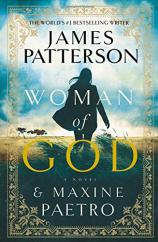Woman of God
Review
Woman of God
WOMAN OF GOD is very different. Those who come expecting something similar to James Patterson and Maxine Paetro’s Women’s Murder Club police procedural series or one of their occasional stand-alone collaborations will be surprised. I am not sure if the book is even properly categorized as a thriller (though parts of it, particularly the first third, would fit the general description), given the multiple themes it visits. But those who have criticized the authors --- Patterson, in particular --- for what they consider to be formulaic writing should give WOMAN OF GOD a chance.
"WOMAN OF GOD may be an uncomfortable book for some, but it’s worth reading for its focus on thought-provoking and controversial issues of faith on several levels, presented in a unique manner."
Brigid Fitzgerald is the “woman of God” of the title. She narrates most of the book in the first person, after a prologue that innovatively describes events taking place 20 years in the future before commencing with the story’s “Now.” It’s a bit head-spinning but makes sense within the body of Brigid’s tale. A great deal of the novel’s opening takes place in Sudan, a preview of hell there for anyone who cares to indulge. Brigid, a Harvard graduate, is practicing meatball surgery and field-stripped medicine for Caring Hands, whose doctors put their lives at risk in treating refugees afflicted by torture, attack and/or disease. She gets wounded, patched up, goes back, leaves, and...well, she seems to be guided by an unseen but nonetheless visible presence. During the course of coming to the aid of an unconventional clergyman who is unjustly accused of an unspeakable crime, Brigid finds herself in the position of assisting in a movement that may well change the Catholic Church.
There are parts of the novel that may be --- and have been --- judged as far-fetched, but one could say that about virtually anyone who has made ground-shifting changes in an institution. Few of us spring out of the womb marked for greatness or otherwise. So why not here? And who’s to say whether it’s by coincidence, divine guidance or some combination of the two that such things occur? Patterson and Paetro give voice to such possibilities, and serve up a large banquet of food for thought in doing so. For those who are unaware, there is major division in the Catholic Church. There are those who feel that a change along the order of what is ultimately presented in WOMAN OF GOD is what is needed to bring the fallen-away faithful home. Others believe that resetting the ecclesiastical clock back to the early 1960s --- Latin mass and all --- would right the course of the ship of faith. About the only thing that the two schools of thought agree upon is that something needs to change, and soon. This book presents one possibility and explores how it might occur.
Again, this is an extremely different book for both authors. The violence in the novel’s early going is graphic and realistic, but nothing new --- these atrocities have been occurring in one form or another since the 1950s --- but those who find name-calling to be starkly unsettling will likely find the descriptions beyond the pale. The writing style here is also slightly varied, with the storytelling a bit more complex and descriptive. Still, Patterson and Paetro see their job as writers to propel the story forward with each sentence; this they do, and superlatively so. WOMAN OF GOD may be an uncomfortable book for some, but it’s worth reading for its focus on thought-provoking and controversial issues of faith on several levels, presented in a unique manner.
Reviewed by Joe Hartlaub on September 30, 2016





